#WOW i was thinking of humanities buzzwords and i bet i could work in something about epistemology there
Explore tagged Tumblr posts
Text
romantic attraction wants you to feel it so badly. bc why am i out here being like, "man i keep daydreaming about a relationship with this person, maybe i Am romantically attracted to them." meanwhile the daydream is that he's closeted so i can't tell anybody about it and we meet up like once a week and that's it. yeah classic normative romantic attraction
#theory brain is so funny i keep being like lalala let me think about my attractions. and then being like. fuck i have to write a Paper now#bc blah blah blah performative nature of attraction#blah blah the extension of capitalism to the private life structures monogamous relationships as property#blah blah the disenfranchisement of gay relationships by making them unsuited for public viewing and thus unable to perform romance#WOW i was thinking of humanities buzzwords and i bet i could work in something about epistemology there#performance is all epistemology anyways.#also i was looking for the word jargon when i called it a buzzword lol#i can't believe i now have to theory tag this post just for this shit.#aromantic#aro#theory stuff#dlc tag
9 notes
·
View notes
Text
Trial 6 - ”hello, world!” (6)


Time to pick up the fallen torch.
Trial: 1 / 2 / 3 / 4 / 5

K.... K1-b0? This - this must be you, right?
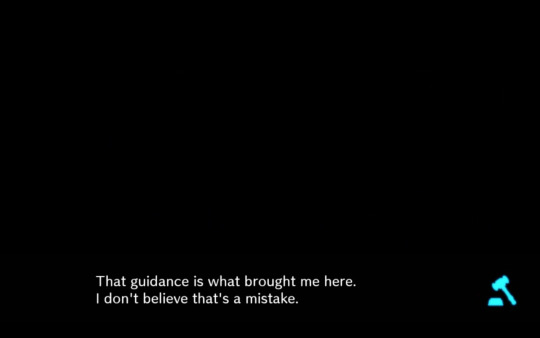


I’ve been waiting for this moment since the beginning of the chapter 3 trial! Finally, the explanation I’ve been craving! If - if the inner voice is coming into play now - it might actually be a benevolent force, right? Maybe? At this point we just need something to keep us moving forward...
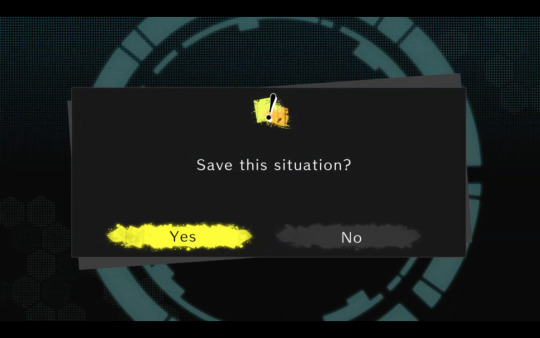
Yes!!!

..... Oops.

“And please choose the right answer this time.”
Okay okay, jeez -


K1... K1-b0? W-Why not - ?
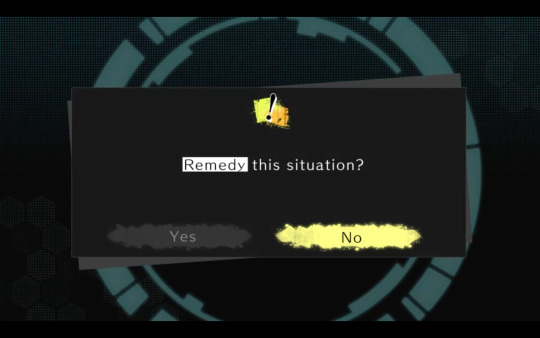
...... remedy the situation. Not save... but fix...???


Voices??? It’s plural now? Does that include me, the player?

K1-b0! Your moment has finally come, with no more lasers or explosions required! hopefully

WAIT
WE’RE OFFICIALLY IN HIS POV NOW???
This is incredibly late game for a protagonist switch b-but okay! also oh god what does that say about Sweetcheeks’s condition -
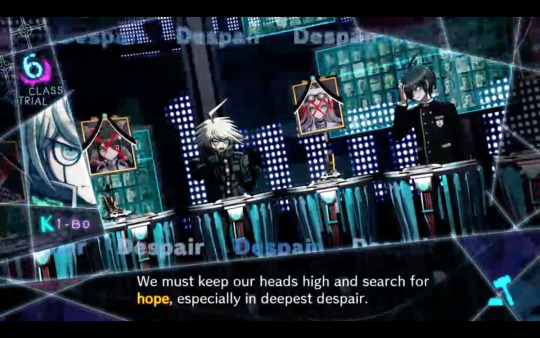

I’m glad we haven’t completely lost Shuichi. ): He really does look like he’s not with us, though. How can we help him? I joke about how much I love this sprite, but it’s awful seeing him like this.
But apparently Shuichi’s been relegated to the sidelines entirely now, because K1-b0 is entirely focused on Jun - Tsumugi. Oh boy, I almost started thinking of her as Junko. I will not let her hide behind her characters, damn it!


Yes! Yes, exactly! She can’t have it both ways!


YOU’RE NOT ALLOWED TO BE ANNOYED YOU APPARENTLY WROTE HIM TO BE THIS WAY!!!

Ooh? Yeah, the text is changing at the bottom...


U U H I’M SORRY YOU CAN’T JUST DROP A BOMB LIKE THAT SO ABRUPTLY -
TSUMUGI LET HIM HAVE HIS COOL MOMENT
HE LITERALLY JUST GOT HIS MOMENT IN THE SUN DON’T JUST UNDERCUT HIM OUT OF NOWHERE

no seriously she didn’t even give him a chance to build up momentum

The way she’s able to just dismiss him so casually like that, just completely trivializing him, is absolutely brutal. also what plotline lol -
I-I mean I’m joking, he has had a ‘coming to terms with his status as a robot amongst humans and accepting himself’ plotline! Sorta! It’s just been pretty.... well, behind the scenes. I just wished we got to see more of you and Miu together at the very least.


Wait -
He’s been the actual audience’s surrogate? That.... that means his ahoge....... really is the connection to the outside... but also, the only thing holding him back from going kamikaze??? It’s basically an outside force that’s been suppressing his free will?
Oh shit... is that why the game switched us to this POV, for that reveal? Well-damn-played, DRV3!
.....
wow this is getting worse and worse, huh

ALSO OH NO WAY TO SMASH HIS FRAGILE SELF-ESTEEM INTO PIECES


“You know all those hi~lar~ious asides everyone had at your expense about you being no more important than your average kitchen appliance? Guess what - ! They were r i g h t!”



Somehow I wonder if it would have been better if it was the mastermind’s will. At least it would assign him some sense of importance, even if that stinging feeling of betraying his friends would be there. At least he wouldn’t literally just be the subject of some nameless audiences’ whims - as it is, he’s basically been relegated to the status of ‘plaything’.
From Chapter 3 onward, when I was thinking about it, I wasn’t sure originally if I should consider it a force for good or evil - it seemed to be generally benevolent and since he didn’t take any actions against anyone, it was generally okay for me to discard it as an extension of ‘a mastermind whose goal was for everyone to be at odds with each other/kill each other’. He was always one of the most willing to cooperate with the others, too! I even considered if any of his actions had indirectly caused tension or murder, and I couldn’t find any instances where he did. But if he’s been at the beck and call of a third party, who’s been directing him for the sake of entertainment? Well, that’s a completely different story. In that context... everything makes... a lot more sense...
.... Except for his Chapter 5 actions??? He nearly got Shuichi to take him out twice??
Wait, actually - oh, this does change how I might look at him from this point on. How often would he consult the voice? Do the decisions override his own every time? Does that mean he can only make a move at the behest of the audience????

THE WAY HE PUT IT IS EVEN MORE DEMEANING
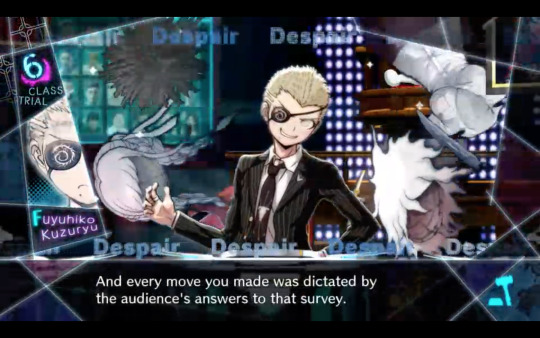
fhgh I guess that answers one of my questions

THE GIMMICK....
every production buzzword thrown in makes my stomach drop more

S-Shit the last time he had his ‘short-circuiting’ sprite was when Kokichi did his mastermind reveal in tandem with the ‘outside world’ reveal - D:

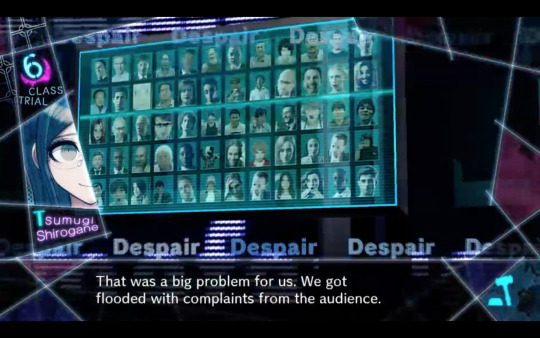
A.... Are you trying to make them feel bad for you, because I don’t think it’s working -
omg I just realized there would totally be twitter threads and reddit posts and stuff dedicated to this, and I’m trying to imagine the rage!posts that would swarm them as users ran to the internet to bitch about how ‘the robot totally isn’t responding to us anymore!’ and ‘I bet they’re rigging it so the ending goes the way they want! What a cop out ending!’ and hell, one of those more topical ‘let 👏 us 👏 control 👏 the 👏 robot 👏 you 👏 cowards 👏’

K1-B0 WAS THE CAMERA?!?!



..................................

glances at my computer monitor, then back here
ahahaha I am officially part of the outside world!mastermind tomfoolery oh god I’m so sorry everyone
Wait.... wait. Wait! So the Nanokumas’ footage is for the mastermind’s exclusive use? Really?
I... I was under the impression that if this audience was watching everyone, they’d have access to everything....
Then how different would this all look from only K1-b0′s eyes?! Did he know about Kaito’s training, for example? About Kaede and Shuichi’s practical inseparability in the first chapter? Wow, how different would this entire thing look from K1-b0′s exclusive POV?

I’m sorry what?


okay okay she’s going off on a despair rant which is - y’know, great, you do you and whatever - but I think it just turned my brain off a little bit. Like I just got catapulted back to DR1.

A-Are we really turning back to the whole ‘Junko persona’ idea? That she took on that role specifically, and by taking on the role as ‘Junko Enoshima’ she feels obligated to follow it through to the end? B-But...... but??? For a show??? That’s... no, that can’t be right, that’s weird, that’s stupid, that can’t be right....


You gotta admire her dedication to the craft I-I MEAN NO
WHAT THE HELL TSUMUGI
THAT IS NOT A GOOD ENOUGH MOTIVE
WHAT THE HELL IS THAT KIND OF REASON


SHUT THE FUCK UP KOMAEDA AND DON’T LOOK SO HAPPY ABOUT THIS oh that actually felt pretty good
i say this as someone whose previous favourite was komaeda it was very love/hate don’t @ me



Oh hey, the opening music is on! Is this the big turnabout we’ve been waiting for? It’s.... so.... weird that it’s coming from K1b0 now? Also wasn’t this sort of the plot of the DR3 anime via the Ultimate Animator or -



I??? I guess??? Weren’t they all just screaming DESPAIR at Shuichi a minute ago??? Isn’t it their comments on the screen???

Inspirational and all but -

I’m GoINg to cHOkE anD DiE
ULTIMATE HOPE ROBOT
FJKGHSDKLFJ

WHAT ARE YOU KIDDING ME
oh shit well there’s text saying Hope now so I guess something has changed out there

I believe it’s called déjà vu.
No seriously, am I hallucinating? Is this not what led to the whole final vote in DR1 or am I going crazy? Is this... what is.... happening........???? And Shuichi has just completely BSoDed in the corner??? Like, is he disassociating right now? Where is he?

It’s interesting that she looks happy here compared to angry Junko. She looked excited earlier when K1-b0 challenged her too (her new jazz-hands!sprite, lol) too, and her voice is on the brink of. Uh. I’m just going to say it’s getting very.... passionate. Is she just that confident or...?


Oh hey their sprites mirror each other. Parallels. :D
I like how Tsumugi is having Makoto say this part ~
But this brings up a good question... how exactly is this so-called final battle going to work? If they can’t fight for the right to leave, then what can they do?


alksdfj Himiko and Maki have also been so quiet this so time - I almost forgot they were there. K1-b0 and Tsumugi are basically the only ones doing the talking and between all the cosplays it feels like there are way more people here than there actually are - which is the point, I think? It really adds to that oppressive, ‘everyone is against you four’ atmosphere.


“- DETAILS DETAILS anyway it’s happening I don’t really care, now about that special vote ~”


This -
This is literally DR1?!?!

This.... this is strange. There has to be incentive to vote one way or the other. Is she going to tie ‘vote for K1-b0’ and ‘you’ll be forced into a world where you can’t/shouldn’t exist’ together vs ‘Vote for Tsumugi′ and ‘stay inside forever’? That’s.... what happened in the others, right?

Shuichi, mentally clocked out but occasionally checking back in so he doesn’t miss anything important: Wow this is absolute bullshit



Yeah... there’s no way they weren’t going to find a way to tempt you to vote for K1-b0. Okay, lay it on us.
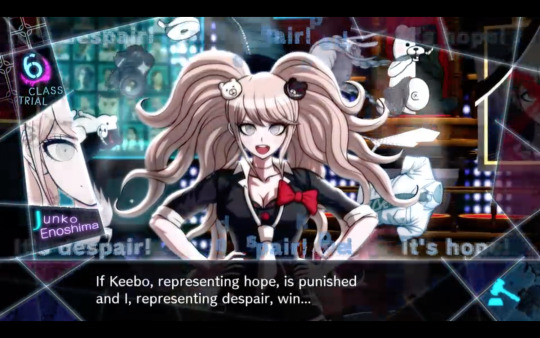

YOU’RE GOING TO MAKE THEM KEEP GOING?!?!

“Ugh why did I let myself get lured back into the conversation by my bitchin’ ‘Lazy Parallel World’ theme song I’m going to mentally check out again because everything hurts and I want to die -”

There.... there aren’t....??

THAT’S NOT ENCOURAGING omg I missed that catchphrase it always made me laugh


I??? I don’t know if I can trust that??? If you can literally make flashback lights to override their old memories - if you can force it on them, whether they’re willing or not - if you can delete the last 24 hours, you could make them do something again??? T-Though if Tsumugi is gone... but then again, there’s a whole team of people behind this apparently! Her being gone means nothing!


“So you cannot leave this place.” Is it? Is it literally, physically impossible to leave this place? That’s the real question. the impossible is possible all you gotta do is make it so... s o b


HOW EVIL CAN YOU GET
HOW COULD YOU NOT EVEN GIVE THEM A POSSIBILITY OF RETURNING TO THEIR ORIGINAL SELVES
WHY WOULD ANYONE MAKE SOMETHING LIKE THAT WHY WOULD THAT BE OKAY FOR A PUBLICLY TELEVISED TV SHOW
For that matter this whole damn series sounds like a snuff film, if actually people are involved. Dear lord, even if they are actually adults - and I desperately hope that if this is true, that the outside world is actually like this, and watches this for fun, then they have a ‘18+’ rule for auditions (actually considering the love hotel exists they must be at least 18 ggh) - even the survivors.... have been killed, in a sense. Their previous selves have been killed. They were dead the moment they entered the world...
So either 16 people consented to ‘dying’ in an existential sense as well as possibly a physical sense, or 16 people were kidnapped and ‘killed’ for the entertainment of the world. I.... I actually... do at least believe, no matter what, that there is a depraved audience viewing this from somewhere. There’s no way there isn’t - this feedback via comments, the scene with that kid Makoto watching this at the beginning of this chapter - those are true. And they were more than okay with the idea of these people dying for their entertainment, even the so-called winners.

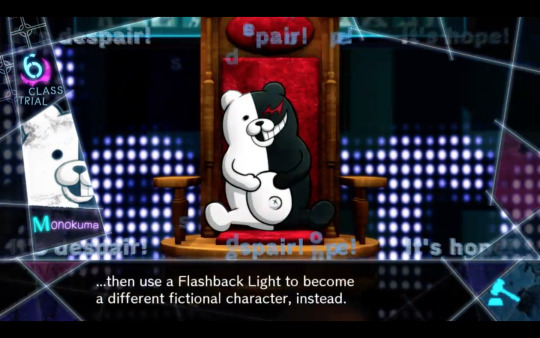
You can only create new identities, not recover them... I, I dunno. Somehow that’s so much more soul-crushing than a lot of the other things that have come up this trial.

t-the way his voice is breaking skdlfjgh -
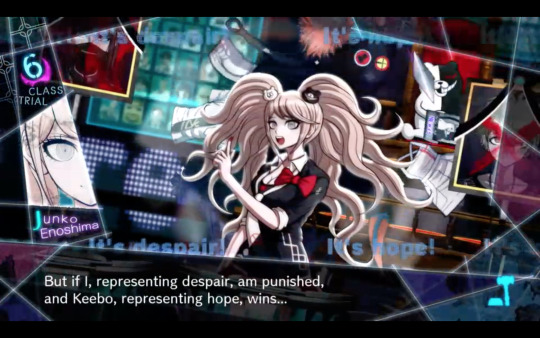



W HA T!?
WHAT THE FU -
WHY?! WHY?! WHY MUST IT ONLY BE TWO, EVERY TIME?! WHY HAVE YOU BEEN SO DETERMINED TO ONLY HAVE TWO PEOPLE SURVIVE TO THE END?!

H.... How the hell.... are they supposed to do that?! Is that how you’re doing it?! Putting the burden of the decision on them, in order to break them?!

H-HE LITERALLY SOUNDS LIKE HE’S GOING TO BREAK DOWN SOBBING ANY SECOND I CAN’T TAKE MUCH MORE OF THIS

She is really trying to push that point, huh... but there it is. They can escape to the ‘outside world’. That is a cold comfort at this point, but...

They...... I don’t. I don’t know. I wouldn’t be able to do this - look my classmates in the eyes and condemn them. I guess this somehow managed to be worse than DR1.

K1-B0 NO
fml of course the only potential option would be students choosing self-sacrifice



I... I’m glad Shuichi is showing concern. I’ve noticed it a few times, how finally in the last chapter or so that he’s been observant of K1-b0′s well-being where the others haven’t been.
But I’m getting distracted - that’s not the point! FML I know he’s been shown those extremist tendencies towards the vague ideal of hope and destroying the despair, I - between this and the ‘destroying the school’ rampage he went on - what is he aiming for? You’re saying that you’re trying to defeat despair, but what is that? Is hope just the opposite of despair? Is despair just whatever Tsumugi says it is, so we’re immediately opposed to it, as the representatives of hope? Are you fighting for them to escape? Why is everyone surviving together ‘living despairful lives’ if Tsumugi is gone and they aren’t trying to kill each other anymore? What makes it that way? Why is this considered ‘defeating despair’? What does that even mean?
I... I guess K1-b0 would be punished anyway if they voted for him, but.... still....

Ugh, I get it. I get that kibou is hope, and that K1-b0 is therefore hope, and that we’re fighting for him to win or... something.... uhghghgh

DON’T YOU FUCKING DARE SHUICHI
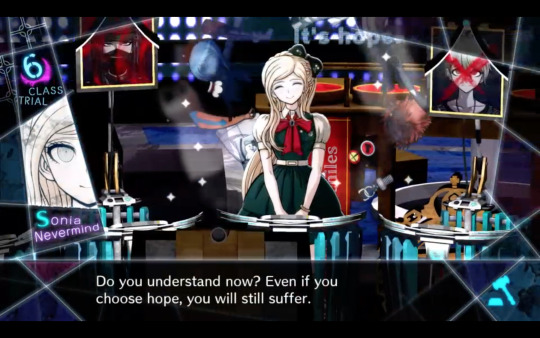
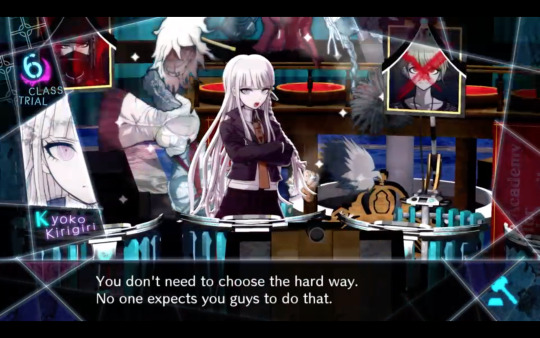







This was such an uncomfortable parade of ~ideal waifus~ sdlkfjsdf especially when we were getting into the ‘super tiny/cute’ territory because I have absolutely no interest in that whatsoever also I accidentally deleted Mahiru’s cameo sorry -
.... I wonder if this would’ve been more effective if I was the target audience for this? Either way, ending on Junko was still an offsetting choice, right? Right??
..........
Wait for that matter, who was this aimed for? Who out of Maki, Himiko or Shuichi would have fallen for that? Even if you believe that Maki or Himiko have an interest in women, nothing about the types they showed or may have shown interest in the game (Maki @ Kaito, Himiko @ Angie, Tenko and hell, even Kokichi) would lend them to the girls Tsumugi just cosplayed as? And even Shuichi’s strongest interest were in Kaede and Kaito - so who is Tsumugi trying to appeal to here?!



Oh shit we’re going into a mass panic debate! Okay, okay okay - !
.... Oh. Oh boy, I have to shoot down every mention of despair. Uh, okay -
OMFG I missed the screenshot but Monokuma started shilling their merch and their website I cannot even deal with how they’ll occasionally devolve into corporate shilling it’s so good -


But!!! We’ve got better things to do than get caught up in Monokuma’s commercializing of the class trial!



MAKI
NO MAKI WHY

ARE YOU TRYING TO MAKE UP FOR LAST CHAPTER IS THAT WHAT’S HAPPENING RIGHT NOW



omg
are you telling me
you’re not even doing this out of guilt
it
it’s spite
you’re doing this out of spite
you’re sacrificing yourself purely ou t of spite


MAKI HOW MANY TIMES ARE YOU GOING TO MAKE THE SAME MISTAKE

“FOR FUCK’S SAKE MAKI, AGAIN??? AGAIN?!?!?!”
“LET ME KILL SOMEONE SAIHARA IT’S MY DAMN TALENT FFS -”

DOES THIS SCREENSHOT SAY ‘SHUICHI LOOKS YUMMY <3′ YOU’RE RUINING THE MOMENT
okay I’m not going to feel right until I write down the new set of comments
Makiiii
my darling assassin T_T
Hope lives on!
Shuichi looks yummy <3
Well said!
Another hope loop?
Hope is contagious!
Two steps forward...
Don’t lose to despair!
Don’t tempt Maki’s fate...
That’s my Maki.
Hope must go on!
Maki, darling...
;_; I’m gonna cry...
Hope vs despair!
one vote for Keebo!
tfw you’re in despair
ALL OF THESE TEARS
Assassiiiiiiiin
I am living for these comments and I would have killed to see the comments for the Chapter 5 trial - hell, the Chapter 4 trial. that’s what let’s plays and YT comments are for I suppose -


tbh I think if that one that keeps lusting after Shuichi comes to help we’re going to need a restraining order


o
o-oh?!

AAAAAAH
NO DON’T
MAKE ME FIGHT HIM
MY ACTUAL SOUL BRO
is............... Is that -
Clair de Lune playing......?!
#Ryou plays drv3#Kiibo#Shuichi Saihara#Keebo#Tsumugi Shirogane#Himiko Yumeno#Maki Harukawa#spoilers#drv3 spoilers#K1-b0
24 notes
·
View notes
Text
Q&A: The Digital Transformation in Staffing

Patrick Beharelle & William Tincup
There’s a lot to be said for digital transformation as it stands today. It’s taken on a variety of industries, from transportation to grocery shopping to banking. New words like “Uberization” have entered our collective lexicon, proof positive of the broad reach of the changes afoot. Still, while some organizations embrace the transformation wholeheartedly, others seem to struggle with the concept, unsure of what it all means. For the sake of getting on the same page, we’ll point to Deloitte’s definition: “Digital transformation is all about becoming a digital enterprise – an organization that uses technology to continuously evolve all aspects of its business models (what it offers, how it interacts with customers and how it operates). In simple terms, digital transformation is how to futureproof a business.” With such a tall order, hesitancy is no wonder, particularly for organizations that deal in the business of people. It’s impossible to deny the disruptive power of digital transformation, however — something Patrick Beharelle, CEO at TrueBlue, openly acknowledged in a recent conversation with RecruitingDaily. TrueBlue is a $2.4 billion staffing company that operates in 70 countries and connects 730,000 people with work annually. They’ve been around for 30 years, so have good insights into the evolution underway in staffing.
Here’s What Patrick Had to Say
Q1 Digital transformation has been somewhat of a buzzword for a couple of years in HR; it has and is being applied to staffing. What’s your take on that evolution?

Staffing has always been a people-first business. It is built on the strength of the relationships that a company has with its clients and its workers or associates. The accelerated adoption of digital strategies in staffing has come with the realization that technology can actually help build stronger human connections, especially with the ubiquitous use of smartphones. Digital transformation has been a top investment priority at TrueBlue over the last several years, and we’re experiencing firsthand how technology is reinventing the traditional staffing model. Our PeopleReady division has a platform called JobStack that has filled approximately 6 million shifts digitally since its inception. It’s currently filling a job every 9 seconds. After we onboard our workers, they can proactively book jobs through a mobile app anywhere, 24/7, versus going to a branch early in the morning or waiting for a text or call. On the flip side, clients can post job assignments 24/7. We have a client that runs a major league baseball stadium who needs hundreds of people to work during the game and assist with pre- and post-game activities. The post-game cleanup is tough for them to staff because these are lower-paying jobs, oftentimes at night. They never know how many people are actually going to show up. Our technology allows the client to actually see the jobs filled in real-time. Many of your readers have used Uber before where they can place an order, and they can see the car coming. So they know exactly what’s happening. It’s the same sort of digital transformation that we’re engaged in. Our client can place an order and see the jobs being filled and who’s filling them in real-time. That’s especially critical for high-volume or last-minute hiring needs. That friction removal for workers and for clients, in my view, is the future of our industry. Q2 You and TrueBlue have some fantastic stories of transformation that need to be told. How have you seen your customers change? And the laborers — how have you seen them embrace this new way to work? We now have close to 90% of our workers signed up with our JobStack mobile app. The cool thing is the system has machine learning. So it gets smarter about what jobs each worker would like, and they see the most relevant opportunities. Workers also get paid quickly. On the client-side, nearly 20,000 are using JobStack. They can see jobs filled in real-time, rate the workers, and set parameters to only see workers that have ratings of 4.0 or higher. Clients can also approve time on the tool among other things. It creates a lot of efficiencies. We had a client that had a tanker tip over on a highway. They essentially had to close the highway because cars couldn’t drive through the chemicals, which were somewhat hazardous. The client needed 25 people to come out immediately to do the cleanup. They were, of course, providing safety gear for the workers. With JobStack, they were able to find 25 people within six minutes. Q3 Wow, Patrick. If you’re not careful, you may wake up one day and find yourself running a technology company. You’ve mentioned Uber. What do you think about them entering, or quasi-entering, the staffing market? Uber created a division called Uber Works. It’s aimed at expanding reach into more traditional shift work. We saw the leaked Uber announcement back in October or November of 2018 and decided to reach out and let them know, “Hey, we’re in this space. We know a lot about it. We’re trying to transform the industry digitally. Sounds like you all are thinking along the same lines. Let’s have a conversation.” We created a new division ourselves called PeopleWorks. It essentially serves as the employer of record for workers who book jobs through the Uber Works app. We’ve started in Chicago, and once that’s proven out in terms of the business model in Chicago, it’ll expand into other markets. Jobstack is a completely separate initiative from this, by the way. There is a little bit of a competitive element, but we believe there’s room for Uber. When you study Uber and look at what they’ve done with cab dispatch, Uber Eats, and Uber Freight, what has ultimately happened is the pie has grown in every market they’ve entered and disrupted. In New York City, for example, there used to be 500,000 cab rides each day. Now the number of cab rides is down, but when you add in Uber and Lyft, you’re up to close to 800,000 rides happening each day. So the pie grew from 500,000 to 800,000. The same has happened for Uber Eats. More people are ordering food as opposed to cooking themselves, so the pie got bigger for restaurants. This is going to happen over time in staffing; there will be a bigger pie because friction will be reduced in the process. Q4 You could have seen that as a threat and put up a bunch of defensive walls. Instead, you said, “No, let’s embrace this. Run towards this. Let’s see what we can do together and how we can learn together. We want to grow the pie together.” Being in the industry, you know that’s not normal with most staffing leadership teams. Kudos to your company and to the vision of everybody involved. Take a look at the dynamics of our industry. We are the second-largest light industrial staffer in North America with a 4% market share. The largest provider has 5%. So, it’s a very fragmented industry. In my view, expanding the pie is the best of all worlds because everybody’s benefiting, but we’d like to take some of that other 96% we don’t have today. Whether it comes through TrueBlue going out and taking that 96% or Uber coming in and taking some and we profit from that partnership — I think there’s a lot of goodness that comes from that. Q5 Last question. I want to understand your vision or what you think is next. What’s right around that corner? Staffing companies today are somewhat rigid in terms of how they engage clients. For example, most staffing companies have a minimum of a four-hour shift because the economics don’t work as well if people work one, two, or three hours. Say you have a restaurant. Following the lunch run, there are a whole bunch of dishes that need to get washed and ready for the dinner period. If it only takes two hours to get the dishes washed and dried, you’re not going to want to hire a contingent laborer to work for four hours. You make do with the resources you have. But, if you could fill that need with a two-hour shift, suddenly it makes economic sense for that restaurant to engage a contingent laborer to come in and do the dishes for two hours and then leave. That’s an example of a pie expanding outcome that I think ultimately is going to happen. I also expect that technology investments will continue to accelerate in our space. The way clients and associates work with staffing firms will continue to evolve. Most companies are relying on temporary labor to avoid fixed costs, particularly in an environment where there’s a lot of uncertainty. They’re looking to stay nimble with a variable cost structure, and technology is simplifying and expediting that process.

Some aspects of temporary staffing, such as professional skills assignments that last six or nine months, aren’t a fit for a digital app focused on shift work. But, I think staffing companies need to decide whether they’re going to drive the disruption or sit on the sidelines and watch it happen. TrueBlue is making some pretty big bets that there is real value creation by removing friction from the process and digitalizing how clients and workers interact with staffing companies. We are actively working to drive disruption in our space because we believe the intersection of technology and human support is the right model for staffing. Final Thoughts (William) If we don’t evolve as a business, as clients, as candidates, employees, etc., or labor, we’ll cease to be relevant, and you’ve done a fascinating job. I’m just really impressed with what you and TrueBlue have done, and there are some amazing stories there.
Going Back To That Deloitte Definition
Staffing organizations become more agile by removing friction, providing customers on either side of the equation with access to the information they need in a readily accessible format. Of course, as Beharelle acknowledges, not all staffing requirements are the same. But either way, given the option to adapt or not, Beharelle advocates for the former, encouraging organizations to drive their transformation, rather than just let it happen – and it’s easy to see why. Read the full article
1 note
·
View note